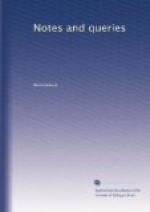“’Many
precious rites
And customs of
our rural ancestry
Are gone or stealing
from us: this, I hope
Will last for
ever.’”
* * * * * {198}
QUERIES.
WHO WROTE SHAKSPEARE’S HENRY VIII.?
I had no sooner read the title of an essay in the current number of the Gentleman’s Magazine, “Who wrote Shakspeare’s Henry VIII.?” than I became aware that I had been anticipated in at least the publication of a discovery I made three or four years ago, but for the making known of which a favourable opportunity had not occurred. The fact is, that I was anxious to arrive at a more satisfactory conclusion than has yet presented itself to me, and a paper on the subject commenced more than two years ago, I, with this feeling, laid aside. My present object is to strengthen the argument of the writer in the Gentleman’s Magazine, by recording the fact that I, having no communication with him, or knowledge of him, even of his name, should have arrived at exactly the same conclusion as his own. That conclusion is (should any of your readers not have seen the article referred to), that Fletcher has at least an equal claim with Shakspeare to the authorship of Henry VIII.
In the unfinished paper to which I have alluded, having asked how it was that, with so much to be learned personal to Shakspeare from his works, our criticism was so limited, and having stated it to be my intention to confine myself to the simple inquiry, “What did Shakspeare really write?” I continued:
“To those who consider the text as having been settled ’by authority,’ this question may seem superfluous; but, not to refer to plays of very early date, in connection with which we could bring forward facts that, we doubt not, would be considered sufficiently startling; we now state it as our belief that a great portion of the play of Henry VIII.—nay, more than half, was not written by Shakspeare.”
My intention now is not to enter into any argument in support of this view, but to state the results, which will be shown in the following extract from my note-book:




